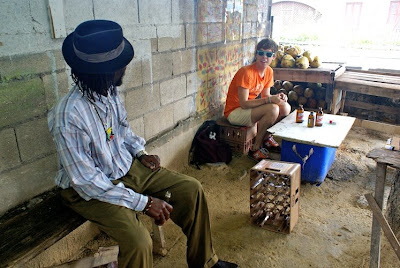An exciting new feature film titled 'Wah Do Dem' (What They Do) premiered at the Los Angeles International Film Festival last month. The film was shot on a shoestring budget in only 3 weeks but this film was made with a lot of passion.
The Film is about Max, a young guy from Brooklyn who wins a cruise to Jamaica. Coincidentally this is also the real life story of the films creators which is what makes this film so intriguing.
The Story.....
Max (Sean Bones) lives in Brooklyn. He enjoys playing soccer, skateboarding, and drinking with his friends at local bars. Last summer he and his girlfriend, Willow (Norah Jones), won a free cruise to Jamaica but two days before the trip, she dumps him cold. When his friends flake, Max winds up alone on the high seas navigating through crowds of grey-haired cruisers. Over the course of several days he flirts with the staff photographer, drinks cocktails with the boat’s celebrity juggler and has several strange encounters with the only other loner (Kevin Bewersdorf).
When the cruise liner docks in Jamaica, Max quickly escapes the tourist zone. At a local jerk stand he meets a charming Rasta who offers to show him a secret beach. Feeling irie as he lounges on the tropical sand with his new friends, Max loses track of time and his personal belongings. In his pathetic attempt to do something about it, he finds that the cultural divides he thought he could transcend are not so simple.
Max (Sean Bones) lives in Brooklyn. He enjoys playing soccer, skateboarding, and drinking with his friends at local bars. Last summer he and his girlfriend, Willow (Norah Jones), won a free cruise to Jamaica but two days before the trip, she dumps him cold. When his friends flake, Max winds up alone on the high seas navigating through crowds of grey-haired cruisers. Over the course of several days he flirts with the staff photographer, drinks cocktails with the boat’s celebrity juggler and has several strange encounters with the only other loner (Kevin Bewersdorf).

When the cruise liner docks in Jamaica, Max quickly escapes the tourist zone. At a local jerk stand he meets a charming Rasta who offers to show him a secret beach. Feeling irie as he lounges on the tropical sand with his new friends, Max loses track of time and his personal belongings. In his pathetic attempt to do something about it, he finds that the cultural divides he thought he could transcend are not so simple.
Naked and broke in a foreign country where he stands out like a sore thumb, Max begins to make his way towards the American Embassy in Kingston. Along the road Jamaica is waiting to meet him.
The Soundtrack....
The film has a great reggae soundtrack featuring artists like: John Holt(Ali Baba), The Congo's(Fisherman), Lloyd & Devon (Red bumb Ball), Suckers.
The Director......
"I think of great musicians like the Congos, who appear in Wah Do Dem, at its spiritual apex, who play “Culture” music with all these elements rooted in Africa.
The nyabinghi drumming sessions – like the scene we portrayed in our movie – are not about authorship or who is steering the rhythm one way or another. Its more like a group attempt to tap into a timeless cultural thing or a feeling that is deeper than any one drummer. That’s why it’s so beautiful. Certainly some rasta chants sound better than others, because some drummers are more skilled or experienced and can listen to the group sound and know exactly where to put the sound of their own voice and drum. The Congos obviously are wizards in this respect."
"I think of great musicians like the Congos, who appear in Wah Do Dem, at its spiritual apex, who play “Culture” music with all these elements rooted in Africa.
The nyabinghi drumming sessions – like the scene we portrayed in our movie – are not about authorship or who is steering the rhythm one way or another. Its more like a group attempt to tap into a timeless cultural thing or a feeling that is deeper than any one drummer. That’s why it’s so beautiful. Certainly some rasta chants sound better than others, because some drummers are more skilled or experienced and can listen to the group sound and know exactly where to put the sound of their own voice and drum. The Congos obviously are wizards in this respect."

"I had the camera with me at all times in a light shoulder bag, and could record at any time. So we were able to capture a lot of documentary-style scenes, and place our narrative within a very real context. During pre-production we had talked about bringing nice lenses and this and that, but looking back it was clearly to our benefit to be quick, able to capture things, and move on to more things."
"When we began shooting the Jamaican portion of the film, the return to a more scripted sequence of scenes reassured our sense that we were telling a cohesive story, but as schedule and resource limitations forced us to re-write our script/outline, we found ourselves racing to Kingston on the final day with 12 hours to find our locations, re-write and shoot the ending to the story."


No comments:
Post a Comment